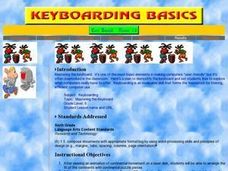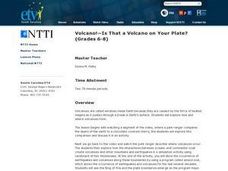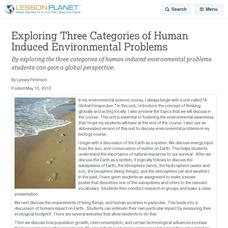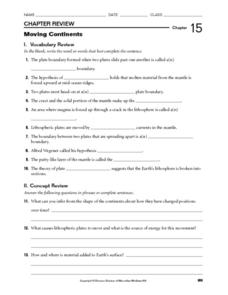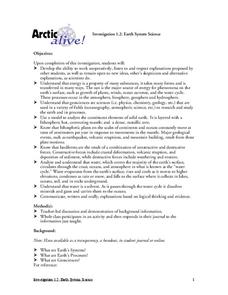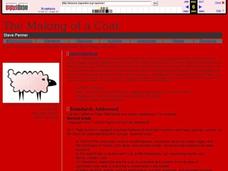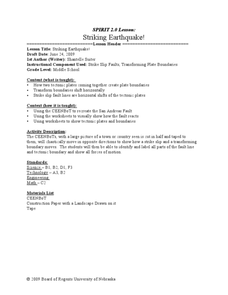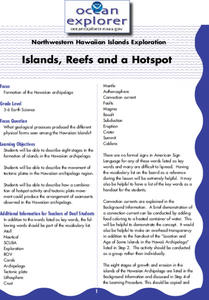Curated OER
Mastering the Keyboard
Sixth graders view an animated program showing how the continents fit together millions of years ago. In groups, they compare and contrast the distribution of rocks and fossils based on how the continents fit together. After reading a...
Curated OER
Plate Tectonics Review
In this plate tectonics worksheet, students review concepts such as the types of plate boundaries, the concept of continental drift, sea-floor spreading, earthquakes, and plate tectonics. They match 30 terms with their definitions.
Curated OER
Volcano! Is That a Volcano on Your Plate?
Students investigate where volcanos come from. For this volcano lesson, students watch videos do Internet research and participate in experiments to discover the cause of volcanos.
Curated OER
Feeling Hot, Hot, Hot!
Students study the different types of volcanoes and how they erupt. In this volcano lesson students identify where volcanoes are most prevalent and options for predicting eruptions.
Curated OER
Exploring Three Categories of Human Induced Environmental Problems
By exploring the three categories of human-induced environmental problems students can gain a global perspective.
Curated OER
Earth Science: The Structure of the Earth
Students identify and complete activities about the structure of the Earth. In this Earth structure lesson, students view a Powerpoint about the Earth's layers and complete a diagram. students compare temperatures in the Earth's layers...
Curated OER
Moving Continents
In this moving continents activity, students review the different types of plate boundaries, what causes earthquakes, and where volcanoes are formed. This activity has 10 fill in the blank and 9 short answer questions.
Curated OER
How Volcanoes Grow
Students study volcanoes including rock fragments, ash, aerosols and gases. In this volcano instructional activity students divide into groups and build models of the three major types of volcanoes.
Curated OER
2005 Submarine Ring of Fire Expedition: What's for Dinner?
Students compare and contrast photosynthesis and chemosynthesis as sources of primary production for biological communities, and describe sources of primary production observed in biological communities associated with volcanoes of the...
Curated OER
What's the Difference?
Students discover how volcanic processes differ at convergent and divergent tectonic plate boundaries. They identify three geologic features that are associated with most volcanoes on Earth.
Curated OER
Earthquake!
Students gain an understanding of earthquakes. They examine vocabulary associated with earthquakes, how earthquakes happen, and preventive measures taken to diminish damage or harm in the event that an earthquake should happen.
Curated OER
Modeling Plate Tectonics
Students investigate the four different ways tectonic plates interact at their boundaries. Using simple available materials, they create models to simulate these interactions present at plate boundaries.
Curated OER
Earth System Science
Students explore the Earth and its ability to support life. They discuss the geosphere and the water cycle and complete the Water Wonders activity. After completing the activity, they respond in their journals and reflect upon the...
Curated OER
What's The Difference?
Young scholars identify geologic features that are associated with volcanoes. In this volcanic exploration lesson plan students compare and contrast convergent and divergent volcanoes and are able to explain why some erupt more...
Curated OER
It's a Gas! Or is it?
Students describe the effects of temperature and pressure on solubility of gases and other materials. In this investigative lesson plan students read an article and answer questions about it.
Curated OER
Where There's Smoke......
Students use fundamental relationships between melting points, boiling points, solubility, temperature and pressure to develop explanations. For this chemistry lesson students complete an activity.
Curated OER
Vocabulary for Earthquakes and Volcanoes
In this plate tectonics worksheet, learners define 27 terms associated with earthquakes and volcanoes such as subduction zone, mantle, and divergent plate.
Curated OER
Pangaea Puzzle
Students explore plate tectonics and the formations of the Earth's surface and why maps are distorted. In this Earth's surface instructional activity students complete a lab and answer questions.
Curated OER
The Making of a Coat
Students read the story A New Coat For Anna and discuss their knowledge on how to make a coat. For this reading and coat making lesson plan, students discuss coat making and listen to a speaker that spins thread to make coats.
Curated OER
Converging Earthquake!
Students identify the fault lines and tectonic plates on the map. In this earth science lesson, students simulate landscape formation using robots. They take a quiz at the end of the lesson to demonstrate mastery.
Curated OER
Striking Earthquake!
Students simulate strike slip faults using CEENBoTs. In this earth science lesson, students identify the fault lines and tectonic plates on a world map. They label the different parts of a fault line.
Curated OER
Give me Food!
Students study the food guide pyramid and use it to create their own eating program.In this health lesson students visit websites to calculate their BMR, activity level and weight then create a nutrition plan
Curated OER
Islands, Reefs, and a Hotspot
Learners describe eight stages in the formation of islands in the Hawaiian archipelago. They examine the movement of tectonic plates in the Hawaiian archipelago region, and describe how plate movement produced the Hawaiian archipelago.
Curated OER
Can You Find Me Now?
Students locate points using longitude and latitude coordinates. They locate their home using longitude and latitude, explore the uses of GPS, and accurately use a GPS.


